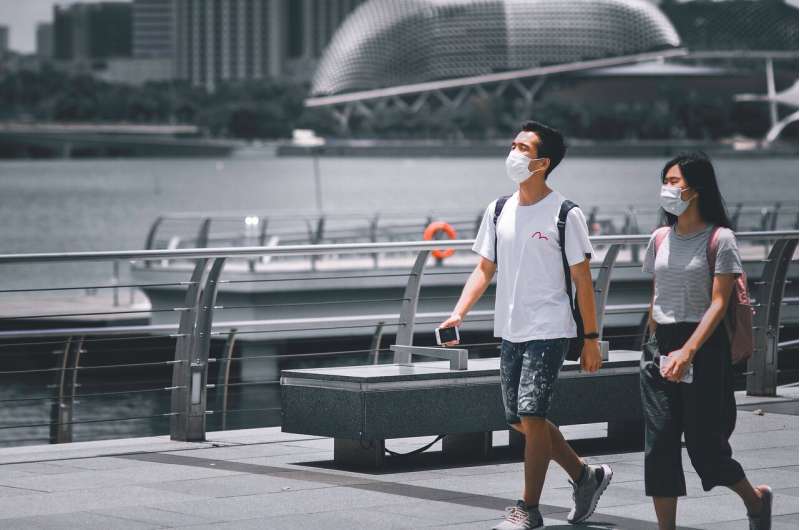Credit: Unsplash/CC0 Public Domain
A new UK study will explore whether tiny airborne droplets and particles can spread coronavirus in settings like supermarkets, schools and busy streets.
Led by Imperial College London and the University of Surrey, the research will collect samples from a wide range of public spaces to see if microscopic droplets suspended in the air, from coughing or talking, can carry and disperse 'live' COVID-19 virus (called SARS-CoV-2) capable of causing infection.
The work will also look at whether the virus can be dispersed further afield by piggybacking on particulate matter in the atmosphere, such as small particles from vehicle pollution or dust.
Funded by the UKRI's Engineering and Physical Sciences Research Council (EPSRC), the COVAIR project will begin this month, with researchers aiming to sample sites across London: first in hospitals, then extending to places such as schools, care homes, offices, traffic intersections, supermarkets, train and tube stations, and buses.
"This research will help to address some of the unanswered questions about airborne transmission of SARS-CoV-2, the virus that causes COVID-19," said Professor Fan Chung, Principal Investigator at Imperial College London.
SARS-CoV-2 virus from infected people can be dispersed by droplets released into the atmosphere through coughing, talking and even normal breathing.
Research suggest that the smallest of these droplets termed aerosols which are 10 times smaller than the width of human hair (less than 5μM in diameter) can remain suspended in the air for hours and travel more than a few meters to land on surfaces, where they can persist for days. Aerosol transmission of SARS-Cov2 has been shown in confined spaces such as in hospitals treating COVID-19 patients.
There is also some evidence to suggest that virus could be dispersed over far greater distances by sticking to pollutant particles in the atmosphere. These aerosols and pollutant particles containing the virus can then be inhaled directly into the lungs of people present in the area.
However, currently there is an important gap in our knowledge as to the levels of 'live' or 'viable' virus circulating in the air that could potentially be inhaled and cause infection.
According to the team, detecting viable virus in the air could have implications for protective measures in public spaces.
Professor Chung explained: "We believe aerosols, like fine droplets from coughing and small particles in the air, could be important for both short- and long-range airborne routes of infection into the lungs, as has been shown for influenza.
"In the case of long-range transmission, we will also check whether the virus can be transmitted on fine pollutant particles. This research could have important implications on how to protect ourselves from being infected."
Professor Prashant Kumar, Co-principal Investigator at the University of Surrey, said: "This project is about using our wealth of collective knowledge to identify whether we can pin down this deadly virus, track its existence in aerosols and make our urban spaces safer."
A number of projects have looked to sample the environment for the presence of the virus in the air, using PCR. While the approach is able to detect SARS-CoV-2 from its genetic fingerprint, it cannot show whether the virus detected is still viable and able to cause infection.
In the COVAIR study, researchers will aim to collect air samples from several locations. These will be transferred to a high containment laboratory and cultured to see if they are able to replicate viable virus—an indicator that the virus can cause an infection in the lungs of the person inhaling the infectious aerosol or particles.
Initially, the team will look to see if they can detect virus in the air in hospitals treating COVID-19 patients. Once their methods are validated, they will then use the approach to hunt for SARS-CoV-2 in other urban environments, including train platforms, office spaces and shopping centers.
Professor Kumar said: "We are actively contributing to COVID-19 research concerning the airborne transmission of COVID-19, which has had a devastating impact on all of our lives and there is still so much we do not understand about it.
"I believe it is only through these collaborative projects that we can better prepare ourselves for the battles against this virus that lie ahead."
Professor Chung added: "COVID-19 continues to have a major impact on the lives of everyone on the planet. It is therefore important to learn more about how we can protect ourselves from this deadly virus.
"COVAIR will look into whether the live virus can be transmitted through aerosols or pollutant particles in the air. It will build on the expertise we have developed in our current INHALE study at Imperial that aims to assess the impact of air pollution on personal health in urban environments."
"If we're able to detect viable virus in the air it may have implications for additional protective measures that people would need to take in public spaces."
Initial sampling is expected to begin at the Royal Brompton Hospital in the coming weeks.
Provided by Imperial College London
























